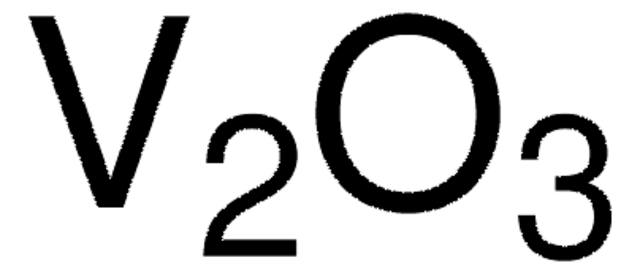215066
Gallium(III)-oxid
≥99.99% trace metals basis
Synonym(e):
Gallium trioxide
Anmeldenzur Ansicht organisationsspezifischer und vertraglich vereinbarter Preise
Alle Fotos(3)
About This Item
Empirische Formel (Hill-System):
Ga2O3
CAS-Nummer:
Molekulargewicht:
187.44
EG-Nummer:
MDL-Nummer:
UNSPSC-Code:
12352303
PubChem Substanz-ID:
NACRES:
NA.23
Empfohlene Produkte
Qualitätsniveau
Assay
≥99.99% trace metals basis
Form
(crystalline powder)
Eignung der Reaktion
reagent type: catalyst
core: gallium
Dichte
5.88 g/mL at 25 °C
SMILES String
O=[Ga]O[Ga]=O
InChI
1S/2Ga.3O
InChIKey
QZQVBEXLDFYHSR-UHFFFAOYSA-N
Suchen Sie nach ähnlichen Produkten? Aufrufen Leitfaden zum Produktvergleich
Allgemeine Beschreibung
Gallium(III) oxide (Ga2O3) is a wide band gap semiconductor that belongs to a family of transparent semiconducting oxides (TSO). It can form different polymorphs such as α-,β-, γ-, δ-, and ε-. Polycrystalline and nanocrystalline Ga2O3 can be prepared using several methods such as chemical vapor deposition, thermal vaporization, and sublimation, molecular beam epitaxy, melt growth, etc. It is widely used as a functional material in various applications including optoelectronics, chemical sensors, catalysis, semiconductor devices, field-effect transistors, and many others.
Anwendung
Starting material for the preparation of Sr2CuGaO3S, an example of a rare square pyramidal gallium.
Ga2O3 is widely used as a host material for the fabrication of electroluminescent devices. For example, europium-doped Ga2O3 thin films can be used as a light-emitting layer to fabricate an optically transparent electroluminescent device.
Due to its distinct optical and electrical properties like moderate conductivity and high laser damage threshold, Ga2O3 can be used in laser-driven electron accelerators, low-loss plasmonics, and Si-based dielectric laser accelerators.
It can also be used as an effective catalyst for the dehydrogenation of propane to propene.
Due to its distinct optical and electrical properties like moderate conductivity and high laser damage threshold, Ga2O3 can be used in laser-driven electron accelerators, low-loss plasmonics, and Si-based dielectric laser accelerators.
It can also be used as an effective catalyst for the dehydrogenation of propane to propene.
Lagerklassenschlüssel
11 - Combustible Solids
WGK
WGK 2
Flammpunkt (°F)
Not applicable
Flammpunkt (°C)
Not applicable
Persönliche Schutzausrüstung
Eyeshields, Gloves, type N95 (US)
Hier finden Sie alle aktuellen Versionen:
Besitzen Sie dieses Produkt bereits?
In der Dokumentenbibliothek finden Sie die Dokumentation zu den Produkten, die Sie kürzlich erworben haben.
Kunden haben sich ebenfalls angesehen
Bipin Pandey et al.
Langmuir : the ACS journal of surfaces and colloids, 28(38), 13705-13711 (2012-09-01)
This paper reports the formation of self-organized nanoporous gallium oxide by anodization of solid gallium metal. Because of its low melting point (ca. 30 °C), metallic gallium can be shaped into flexible structures, permitting the fabrication of nanoporous anodic oxide
Vladimir N Sigaev et al.
Nanoscale, 5(1), 299-306 (2012-11-21)
Nanoparticles in amorphous oxides are a powerful tool for embedding a wide range of functions in optical glasses, which are still the best solutions in several applications in the ever growing field of photonics. However, the control of the nanoparticle
Sr(2)CuGaO(3)S, a Rare Example of Square Pyramidal Gallium.
W. J. Zhu et al.
Inorganic chemistry, 36(17), 3576-3577 (1997-08-13)
Yi-Jen Wu et al.
ACS nano, 4(3), 1393-1398 (2010-02-13)
Light-scattering properties of individual gold-in-Ga(2)O(3) peapod nanowires and gold-in-Ga(2)O(3) core/shell nanowires were investigated by optical dark-field microscopy. The observed scattering peaks are suggested to result from plasmonic resonance of the gold nanopeas and nanorods in the Ga(2)O(3) nanowires. As the
Rujia Zou et al.
Small (Weinheim an der Bergstrasse, Germany), 7(23), 3377-3384 (2011-10-06)
Nanoelectromechanical system switches are seen as key devices for fast switching in communication networks since they can be switched between transmitting and receiving states with an electrostatic command. Herein, the fabrication of practical, nanoscale electrically/thermally driven switches is reported based
Unser Team von Wissenschaftlern verfügt über Erfahrung in allen Forschungsbereichen einschließlich Life Science, Materialwissenschaften, chemischer Synthese, Chromatographie, Analytik und vielen mehr..
Setzen Sie sich mit dem technischen Dienst in Verbindung.










